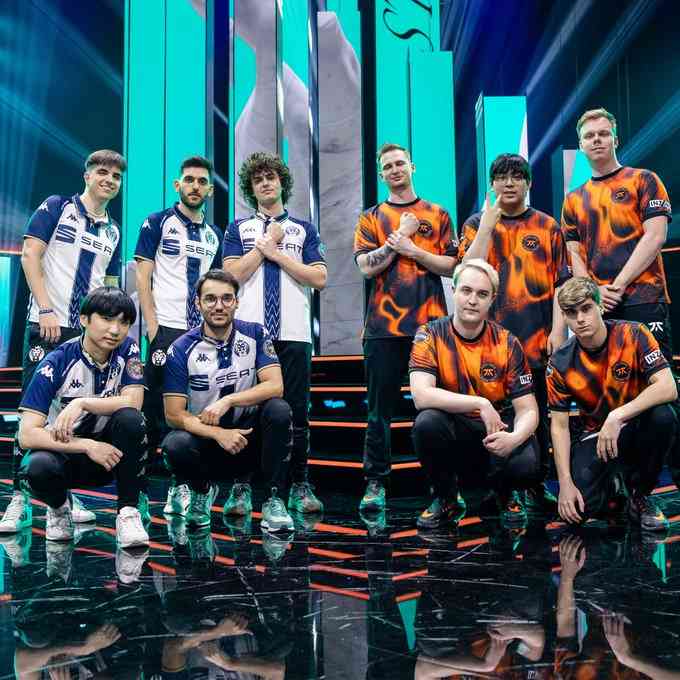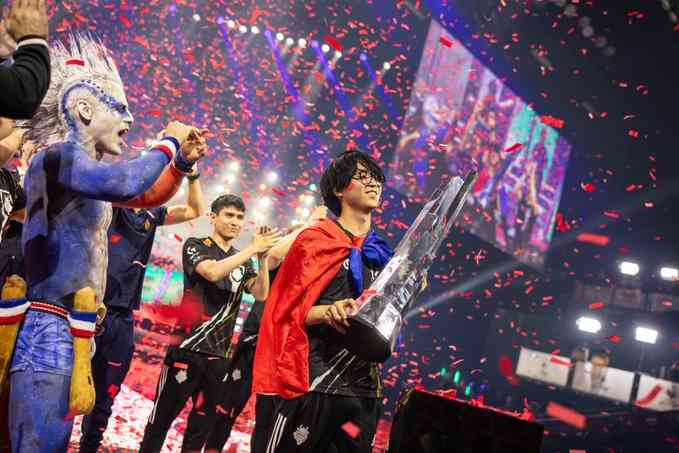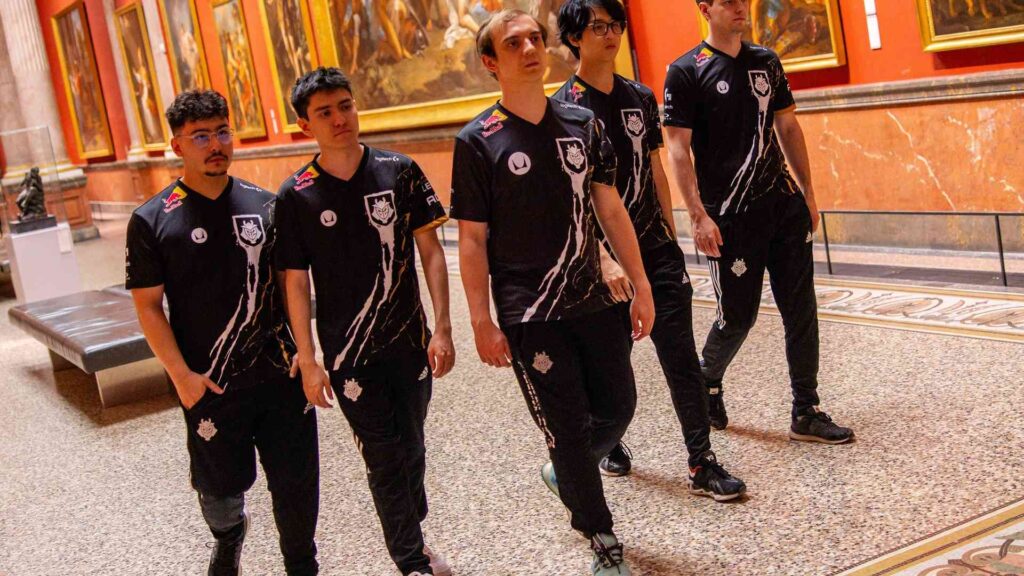It’s almost like everything went according to plan. In a weekend that crowned G2 Esports and Karmine Corp the top of their respective supreme European competitions, although there was no shortage of excitement, a lot of League of Legends esports fans probably had their fantasy right.
In fact, what we witnessed was a pure expression of what we call club DNA. This kind of force, sometimes mystical, rarely explainable, scarcely believable, but which somehow always imposes itself on the destiny of organizations. Great clubs just seem incapable of dying. Esports and traditional sports enthusiasts alike can think of teams that always reach expectations (whether high or low) even when they’re the least expected to do so. In Montpellier’s Sud de France Arena, it even started with the names of the qualified teams.
Contents
Fnatic almost like clockwork
The Club DNA theory has its critics. It feels like stripping teams, which in many cases don’t even have rosters as common denominators, of their credit. It also feels like offering lazy analysis; failing to account for confrontation dynamics and tactical clashes. In some rare but notable cases though, pillars among a team’s direction or coaching staff, sometimes even a player, or a combination of all these elements, remain and manage to inject values that translate into an irresistible force.
LEC viewers most probably felt that this year with Fnatic. Even Iván ‘Razork’ MartÃn Diaz’s own explanation to their improbable Finals run mentions it: ‘It’s just the DNA, I feel, of the team.’ Something always goes wrong, but they (almost) always find the resilience to thrive.
 MAD and FNC rosters, from left to right and up to down: Elyoya, Nisqy, Carzzy, Chasy, Hylissang – Humanoid, Noah, Wunder, Trymbi, Razork (Image Credits: @LEC)
MAD and FNC rosters, from left to right and up to down: Elyoya, Nisqy, Carzzy, Chasy, Hylissang – Humanoid, Noah, Wunder, Trymbi, Razork (Image Credits: @LEC)Down but never out, this year the organization rose from the ashes to complete an insane comeback from 9th in Winter and 8th in Spring ‘ which tends to make you reconsider the format, or… credulously embrace that euphoric Sam Mathews’ tweet. And it did so spectacularly. From Martin ‘Rekkles’ Larsson rejoining before dramatically leaving the roster again to Ãscar ‘Oscarinin’ Muñoz Jiménez breaking his hand as his terrible debuts turned into a very promising rookie year, and Martin ‘Wunder’ Hansen picking up the torn pieces of his contract to sub-in at the last minute, Fnatic fans have seen it all. But this franchise now seems used to impromptu events that make life more difficult than it should be.
Another thing Fnatic has apparently become used to its wild lower-bracket runs. For the third summer in a row, the Black and Orange have had to fight their way all the way up the losers’ bracket. As in 2021, when they knocked Vitality, Misfits, G2, and Rogue out of contention, it took them three 5-game series to reach the Grand Finals this year. And as in 2022, they secured a Worlds qualification after dragging Excel to the Silver Scrapes. Like it was always meant to be.
Mad, though very consistent, Lions
Coming into the semifinals, Fnatic were facing Mad Lions, who also demonstrated exceptional traits of consistency by earning their spot to Montpellier and South Korea. In their short four-year history, driven since day one by James ‘Mac’ MacCormack, they simply never missed a single World Championship. This time around, a disappointing Summer split, where they failed to reach the playoffs by going 0-4 in groups, didn’t prevent them from making it to the final week-end of the season safe and sound.
Fnatic players started the confrontation by living up to their club’s DNA. An unstoppable Razork on mage junglers, a composed Marek ‘Humanoid’ Brázda meeting expectations when it mattered the most, and a refreshing Oh ‘Noah’ Hyeon-taek writing a new page of the Fnatic Korean history book’ though maybe not in a convincing manner as in Summer split. They quickly put them comfortably ahead. Commentators were readying themselves to write about MAD’s poor Arena record and Zdravets ‘Hylissang’ Iliev’s poor series against his former organization.
Then suddenly, Matyáš ‘Carzzy’ Orság totally soaked up pressure and reversed the mental, and thus mechanical, dynamics between the two ad carries. A pentakill and Fnatic’s reckless baron contests later, Mad Lions sent the series to Silver Scrapes’ only for Adrian ‘Trymbi’ Trybus to pull a clutch Alistar pick out of his pocket that was enough to carry the game in an Ivern-differential environment. Because Games 5 are Fnatic’s realm.
The EMEA Masters fortress has blue walls
Even in a tier as fluid as Europe’s second division, club essentialism shone in the EMEA Masters Finals. On Friday night, before the eyes of their own Blue Wall and totally unbiased casters, Karmine Corp lifted their fourth European title in as many appearances and only three years at this level of competition. Quite uniquely, nothing screams club DNA more than this Karmine Corp roster. Lucas ‘Saken’ Fayard never left the team. Raphaël ‘Targamas’ Crabbé, Jakub ‘Cinkrof’ Rosicki, and Lucas ‘Cabochard’ Simon-Meslet have taken part in more than half of the organization’s existence. Further, current head coach Rehareha ‘Reha’ Ramanana spent all his career at Karmine, earning a promotion when Yanis ‘Striker’ Kella seized the opportunity to coach Team BDS. One can easily see how this team maintains family values, mostly for better, and rarely for worse.
On the rift, though, the first strike came from the only newcomer of the roster: 2023 LFL Most Valuable Player and Rookie of the Year, Caliste ‘Caliste’ Henry-Hennebert. He set the stage for yet another unbelievable performance as early as Game 1. Full of composure, this audacious Yasuo first game foreshadowed the way he would take the upper hand over David ‘Supa’ MartÃnez GarcÃa. Caliste would indeed, later during Game 5, solo-kill him under turret and against the play’s momentum.
As previously stated, Karmine Corp gave themselves a scare going all the way to a decider. Movistar Riders deserve credit for the way they managed to mentally switch and change their game plan after an intense 0-2 on hostile ground. Their Maokai response against Saken’s Azir (which he kept all series long) became decisive for MRS. On a more micro level, Ismaïl ‘Isma’ Boualem’s impressive fourth game, Supa’s super carry abilities, and BartÅomiej ‘Fresskowy’ Przewoźnik’s key midlane ad carries account for this near-remontada.
Unfortunately for them, the crowd’s help just made Karmine Corp irresistible. The last early game of the series felt like a washing machine, with 9-1 and almost a 4,000-gold lead on the scoreline at the 15-minute mark. If Movistar Riders managed to blow off some steam by turning this into a nailbiter midgame, what truly was the ultimate Game 5 draft (Ornn, Maokai, Azir, Xayah, Rakan: a lot of peeling and front-to-back combined with two long-range engage tools) clinched Karmine Corp the win. A dynasty was born.
Gamers 2, and as many stomps
A break from G2’s tradition, the best European team’s midlane wasn’t its strong side. Not that Rasmus ‘Caps’ Winther played poor ‘ although he’s supposedly past his prime, he remains unchallenged in Europe. But in general the rest of his team is just too dominant. Sergen ‘BrokenBlade‘ Ãelik displayed the best Western toplaner performance in a long, long time, throughout the summer. Martin ‘Yike‘ Sundelin pulled up one of the most accomplished rookie seasons of all time, while Steven ‘Hans Sama’ Liv seems to have fully healed from his Los Angeles hiccup. And Mihael ‘Mikyx’ Mehle, well, earned no less than the MVP award and consolidated his legacy as the best European support ever.
In this state of things, you just knew that the G2 steamroller was on its way to the organization’s eleventh LEC title. You knew that general manager Romain Bigeard’s body paint countdown was purely prophetic. You knew that League of Legends is a fun game where ten players threaten the enemy nexus for 35-ish minutes, and at the end, G2 always wins.
 Hans Sama, the first French LEC champion since Paul ‘sOAZ’ Boyer (2018), lifting the trophy on home soil (Image Credits: @LEC).
Hans Sama, the first French LEC champion since Paul ‘sOAZ’ Boyer (2018), lifting the trophy on home soil (Image Credits: @LEC).With only Fnatic on their way to the top of Europe, it all started with a level-3-gank insanely dodged by Hans Sama, which started a positive snowball effect for G2. Fnatic, unable to let go of the game and driven by their will to create plays, then engaged in a bloodbath that ultimately fed K’Sante to a point of no return. There went, as G2 warmed up, the Black and Orange’s only chance to claim a glimmer of momentum. Noah’s rebellion after a stomped second game salvaged a little pride for his side, but that Fnatic gain was only answered by another powerful stomp as G2 closed Game 4 in 24 minutes with a 15,000-gold advantage.
In the end of this 2023 LEC Season, we’re not quite sure if G2 Esports added one or three official titles to their LEC tally, but we do know that they were, have been, and are the best team in Europe, and probably the Old Continent’s only chance to shine at Worlds.



